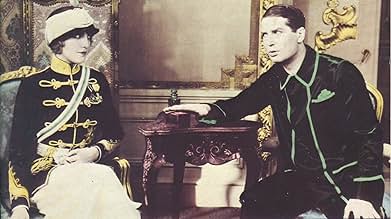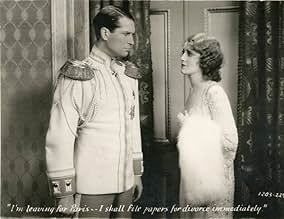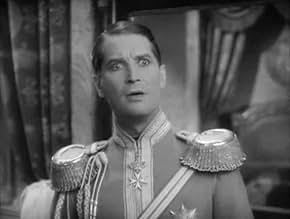IMDb-BEWERTUNG
7,0/10
2768
IHRE BEWERTUNG
Die Königin des mythischen Sylvania heiratet einen Höfling, der sein neues Leben als unbefriedigend empfindet.Die Königin des mythischen Sylvania heiratet einen Höfling, der sein neues Leben als unbefriedigend empfindet.Die Königin des mythischen Sylvania heiratet einen Höfling, der sein neues Leben als unbefriedigend empfindet.
- Für 6 Oscars nominiert
- 4 Gewinne & 6 Nominierungen insgesamt
Carl Stockdale
- The Admiral
- (as Carlton Stockdale)
Albert De Winton
- Cabinet Minister
- (as Albert de Winton)
Empfohlene Bewertungen
This is very much like a Vienese operetta, with its principle couple - Chevalier and MacDonald - and its second couple, the help, who mirror the principle couple in a light way. The music often sounds like minor Johann Strauss or early Lehar, and the plot owes a lot to The Merry Widow.
Still, my favorite aspect of this movie is that, being pre-code, it constantly flirts with the edge of what could be dared in those days. It's never in any way obscene or vulgar, but it's constantly winking at the audience about matters sexual, and of course the last shot is of the couple in bed - one bed. Hollywood wouldn't enjoy that freedom for another 30 years.
It's all very light and, in the end, not very memorable, but along with One Hour with You, which I probably prefer, a very enjoyable way to spend an evening.
Still, my favorite aspect of this movie is that, being pre-code, it constantly flirts with the edge of what could be dared in those days. It's never in any way obscene or vulgar, but it's constantly winking at the audience about matters sexual, and of course the last shot is of the couple in bed - one bed. Hollywood wouldn't enjoy that freedom for another 30 years.
It's all very light and, in the end, not very memorable, but along with One Hour with You, which I probably prefer, a very enjoyable way to spend an evening.
the sort of film that filmmakers to day are unable to make. it is too simple for them. it has a story with a beginning, middle and end. far too simple for the current crop of genius. the stars were real stars i swear they sometimes glittered. the directors famous touch was in fine form and even after many years i can remember walking home in a romantic glow. could anyone do the same after watching one of to days EPICS. i agree there must have been sound faults and other technical problems though i do not remember them. later on i heard a radio version also enjoyed. like far too many films of the past the love parade is unavailable to us on video or DVD. it may have been damaged and no longer usable though i do hope not. if there is any way to urge the current copyright owners to re-issue the film i would certainly like to be involved. are there other enthusiasts out there who agree?
The Love Parade which was Maurice Chevalier's second feature film is as fresh today as it was in 1929 when it garnered a whole flock of Academy Award nominations. It was Paramount's prestige film of the year, in fact I'm not sure if any other Paramount features got any nominations for anything that year.
It was Ernst Lubitsch's first sound feature film and apparently the man with the famed Lubitsch touch hit the ground running in the new medium with a bunch of players who were also fresh to cinema because of the coming of sound. This was Jeanette MacDonald's film debut and while she's not billed over the title as Chevalier was, her part is every bit as important and as big as his.
Maurice Chevalier has been cutting a wide swath among the ladies of Paris where he's attached to the embassy of Sylvania. So much so that he's been recalled to Sylvania for a reprimand or so he thinks.
Jeanette MacDonald is the new young Queen of Sylvania and she's got to marry for reasons of state. As did many a female monarch, British ones like Victoria, Anne, and the two Marys all took husbands for reasons of state and the method they chose them was as much political as anything else. Only Elizabeth I managed to escape the marriage obligation.
While her diplomats look askance on Chevalier's romantic antics, Jeanette sees in him one grand candidate for marriage. If she's got to get married for reasons of state by God she's going to pick a husband who's going to be ready to romp at a royal command.
The Love Parade's musical score was written by Victor Schertzinger and Clifford Grey. The first notes Jeanette MacDonald ever sang on screen were from her hit song, Dream Lover. It's not the same song as Bobby Darin had a hit in the Fifties from. Film fans will recognize it as the flying theme that Cecil B. DeMille used as background music when Betty Hutton and Cornel Wilde were on the trapeze in The Greatest Show On Earth. Jeanette also sings March of the Grenadiers as she reviews her palace guard.
Chevalier's two big numbers were Paris Stays The Same and My Love Parade from whence the title comes. Both were written to suit his grand boulevardier style. Some comic numbers were written for Lupino Lane and Lillian Roth who are the second leads. Lupino is Chevalier's orderly and Roth is one of her maids. They make a cute pair with their impish behavior, aping their masters.
The Love Parade got six Oscar nominations, but did not win in any category and the categories were a lot fewer back in the day. It was up for Best Picture, Best Director, Best Actor for Maurice Chevalier, Best Sound Recording, Best Art Direction, and Best Cinematography. It also has a lot fewer overacted performances that were the norm in those early sound days. It was as if Ernst Lubitsch instinctively knew what to do with sound in film.
The story is about a Prince Consort and usually the model that is held up is that of Prince Albert for Queen Victoria. But that's not the road Chevalier wants to take.
It's a continental story and yet Lubitsch as he always did, made those stories appealing to American audiences. After 80 years, The Love Parade is still appealing.
It was Ernst Lubitsch's first sound feature film and apparently the man with the famed Lubitsch touch hit the ground running in the new medium with a bunch of players who were also fresh to cinema because of the coming of sound. This was Jeanette MacDonald's film debut and while she's not billed over the title as Chevalier was, her part is every bit as important and as big as his.
Maurice Chevalier has been cutting a wide swath among the ladies of Paris where he's attached to the embassy of Sylvania. So much so that he's been recalled to Sylvania for a reprimand or so he thinks.
Jeanette MacDonald is the new young Queen of Sylvania and she's got to marry for reasons of state. As did many a female monarch, British ones like Victoria, Anne, and the two Marys all took husbands for reasons of state and the method they chose them was as much political as anything else. Only Elizabeth I managed to escape the marriage obligation.
While her diplomats look askance on Chevalier's romantic antics, Jeanette sees in him one grand candidate for marriage. If she's got to get married for reasons of state by God she's going to pick a husband who's going to be ready to romp at a royal command.
The Love Parade's musical score was written by Victor Schertzinger and Clifford Grey. The first notes Jeanette MacDonald ever sang on screen were from her hit song, Dream Lover. It's not the same song as Bobby Darin had a hit in the Fifties from. Film fans will recognize it as the flying theme that Cecil B. DeMille used as background music when Betty Hutton and Cornel Wilde were on the trapeze in The Greatest Show On Earth. Jeanette also sings March of the Grenadiers as she reviews her palace guard.
Chevalier's two big numbers were Paris Stays The Same and My Love Parade from whence the title comes. Both were written to suit his grand boulevardier style. Some comic numbers were written for Lupino Lane and Lillian Roth who are the second leads. Lupino is Chevalier's orderly and Roth is one of her maids. They make a cute pair with their impish behavior, aping their masters.
The Love Parade got six Oscar nominations, but did not win in any category and the categories were a lot fewer back in the day. It was up for Best Picture, Best Director, Best Actor for Maurice Chevalier, Best Sound Recording, Best Art Direction, and Best Cinematography. It also has a lot fewer overacted performances that were the norm in those early sound days. It was as if Ernst Lubitsch instinctively knew what to do with sound in film.
The story is about a Prince Consort and usually the model that is held up is that of Prince Albert for Queen Victoria. But that's not the road Chevalier wants to take.
It's a continental story and yet Lubitsch as he always did, made those stories appealing to American audiences. After 80 years, The Love Parade is still appealing.
As covered in previous comments The Love Parade is important historically, with it being Jeanette MacDonald's debut, Maurice Chevalier's second film, director Ernst Lubitsch's first sound picture and Chevalier and MacDonald's first pairing together. But The Love Parade still does manage as well to be, apart from some primitive sound quality, a great film and compares favourable within Lubitsch's mostly consistent(in a good way) filmography.
The costumes and sets in The Love Parade are wonderfully opulent and the photography is very stylishly done. Lubitsch's distinctive style is evident all through the film, bringing a huge amount of class, subtlety and elegance. What he also did brilliantly was making camera and sound effects more flexible counterpointing the music numbers, and also even for his first sound picture having a technical mastery already with apparently having two sets built for one number shot simultaneously with the orchestra off screen between the two sets, going back and forth in the editing, something that had never been done before. The songs are very pleasant and memorable at least, with the beautiful and catchy duet My Love Parade, the charmingly intimate Dream Lover and the hugely entertaining Let's Be Common faring the best. The choreography's elegant and poised and in other places witty and inventive, the highlight number in this regard being Let's Be Common.
The script was one of my favourite things about The Love Parade, it was very sophisticated and deliciously witty, particularly funny was the writing regarding the Count's political uselessness. There's even some sexual innuendo that was very ahead of its time back in 1929. The story is full of immense charm and sophisticated style with a seductive edge, not ever making the mistake of being dull or improbable(and if it did really it would not be as glaring as the story in Monte Carlo). The characters are very likable and the performances from all four leads do not disappoint at all. Noteworthy especially were MacDonald whose screen debut was a revelation being both sexy and regal and singing like an angel and Lupino Lane whose incredible physical comedy is enough to make one seethe with envy. Sassy Lillian Roth sparkles as Lane's partner and Chevalier is the epitome of Gallic warmth and charm. The chemistry between him and MacDonald beguiles and for two relatively different singing styles they blend remarkably well when singing together.
Overall, a great film. While I may prefer The Merry Widow, Heaven Can Wait, The Shop Around the Corner and especially Trouble in Paradise over The Love Parade it is unsurprising that The Love Parade was a huge hit at the time and still wins over people now. 9/10 Bethany Cox
The costumes and sets in The Love Parade are wonderfully opulent and the photography is very stylishly done. Lubitsch's distinctive style is evident all through the film, bringing a huge amount of class, subtlety and elegance. What he also did brilliantly was making camera and sound effects more flexible counterpointing the music numbers, and also even for his first sound picture having a technical mastery already with apparently having two sets built for one number shot simultaneously with the orchestra off screen between the two sets, going back and forth in the editing, something that had never been done before. The songs are very pleasant and memorable at least, with the beautiful and catchy duet My Love Parade, the charmingly intimate Dream Lover and the hugely entertaining Let's Be Common faring the best. The choreography's elegant and poised and in other places witty and inventive, the highlight number in this regard being Let's Be Common.
The script was one of my favourite things about The Love Parade, it was very sophisticated and deliciously witty, particularly funny was the writing regarding the Count's political uselessness. There's even some sexual innuendo that was very ahead of its time back in 1929. The story is full of immense charm and sophisticated style with a seductive edge, not ever making the mistake of being dull or improbable(and if it did really it would not be as glaring as the story in Monte Carlo). The characters are very likable and the performances from all four leads do not disappoint at all. Noteworthy especially were MacDonald whose screen debut was a revelation being both sexy and regal and singing like an angel and Lupino Lane whose incredible physical comedy is enough to make one seethe with envy. Sassy Lillian Roth sparkles as Lane's partner and Chevalier is the epitome of Gallic warmth and charm. The chemistry between him and MacDonald beguiles and for two relatively different singing styles they blend remarkably well when singing together.
Overall, a great film. While I may prefer The Merry Widow, Heaven Can Wait, The Shop Around the Corner and especially Trouble in Paradise over The Love Parade it is unsurprising that The Love Parade was a huge hit at the time and still wins over people now. 9/10 Bethany Cox
An early musical (Ernst Lubitsch's first talkie), so the sound can be hard on the ears (especially Jeanette MacDonald's high notes). The plot as such is forgettable, but see it for the performances.
It seems odd to match Jeanette MacDonald's operetta singing with Maurice Chevalier's cabaret, but each gets their own numbers and they join in the middle for duets.
Lupino Lane and Lillian Roth do two wonderful vaudeville style song and dance numbers.
It seems odd to match Jeanette MacDonald's operetta singing with Maurice Chevalier's cabaret, but each gets their own numbers and they join in the middle for duets.
Lupino Lane and Lillian Roth do two wonderful vaudeville style song and dance numbers.
Wusstest du schon
- WissenswertesConsidered by many to be the first musical film in which the songs were integrated with the story.
- PatzerThe fact that Count Alfred (Maurice Chevalier) speaks with a French accent, even though he is not supposed to be French, is really not an "error". However, by adding a scene to attempt to explain this anomaly, it only serves to highlight the accent discrepancies in the casting. For instance, in contrast to the accent discrepancy with Chevalier's character, no one seems to notice that his French servant, Jacques (Lupino Lane), speaks British English with no discernible French accent.
- Zitate
Queen Louise: Why am I always awakened from my dreams?
- Alternative VersionenThere is an Italian edition of this film on DVD, distributed by DNA Srl: "IL PRINCIPE CONSORTE (1929) + AMAMI STANOTTE (1932)" (2 Films on a single DVD), re-edited with the contribution of film historian Riccardo Cusin. This version is also available for streaming on some platforms.
- VerbindungenFeatured in Göttinnen der Liebe (1965)
Top-Auswahl
Melde dich zum Bewerten an und greife auf die Watchlist für personalisierte Empfehlungen zu.
- How long is The Love Parade?Powered by Alexa
Details
- Erscheinungsdatum
- Herkunftsland
- Sprachen
- Auch bekannt als
- The Love Parade
- Drehorte
- Produktionsfirma
- Weitere beteiligte Unternehmen bei IMDbPro anzeigen
Box Office
- Budget
- 650.000 $ (geschätzt)
- Laufzeit1 Stunde 47 Minuten
- Farbe
Zu dieser Seite beitragen
Bearbeitung vorschlagen oder fehlenden Inhalt hinzufügen



































